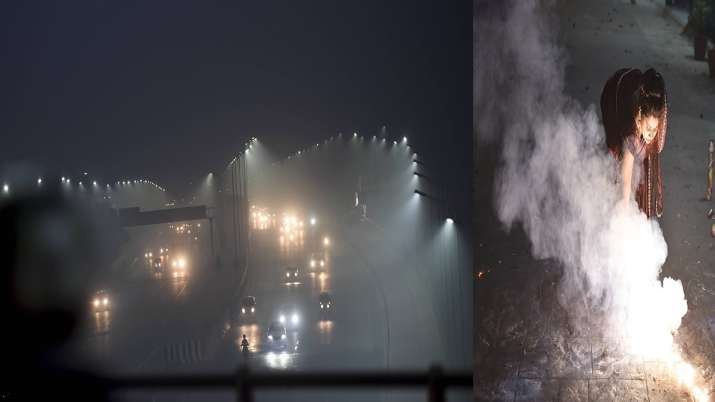
With safety at stake, many in the national capital defied the cracker-ban, turning the air quality in the region to "severe" with stubble burning accounting for 32 per cent of Delhi's PM2.5 pollution. At Air Quality Index (AQI) at 414, Delhi recorded the worst air quality in four years. Last year, the city recorded a 24-hour average AQI of 337 on Diwali last year and 268 and 400 in the subsequent two days. In 2018, the 24-hour average AQI was 281 on Diwali, deteriorated to 390 the next day and remained "severe" on three consecutive days. Likewise in 2019, Delhi's 24-hour average AQI on Diwali was 319. Earlier, the Ministry of Earth Sciences' air quality monitor, SAFAR, had said that the PM2.5 concentration in Delhi on Diwali was "likely to be the lowest" of the last four years if no firecrackers were burnt.

With safety at stake, many in the national capital defied the cracker-ban, turning the air quality in the region to "severe" with stubble burning accounting for 32 per cent of Delhi's PM2.5 pollution. At Air Quality Index (AQI) at 414, Delhi recorded the worst air quality in four years. Last year, the city recorded a 24-hour average AQI of 337 on Diwali last year and 268 and 400 in the subsequent two days. In 2018, the 24-hour average AQI was 281 on Diwali, deteriorated to 390 the next day and remained "severe" on three consecutive days. Likewise in 2019, Delhi's 24-hour average AQI on Diwali was 319. Earlier, the Ministry of Earth Sciences' air quality monitor, SAFAR, had said that the PM2.5 concentration in Delhi on Diwali was "likely to be the lowest" of the last four years if no firecrackers were burnt. November 15, 2020 at 08:29AM https://ift.tt/3pvlS7q
 With safety at stake, many in the national capital defied the cracker-ban, turning the air quality in the region to "severe" with stubble burning accounting for 32 per cent of Delhi's PM2.5 pollution. At Air Quality Index (AQI) at 414, Delhi recorded the worst air quality in four years. Last year, the city recorded a 24-hour average AQI of 337 on Diwali last year and 268 and 400 in the subsequent two days. In 2018, the 24-hour average AQI was 281 on Diwali, deteriorated to 390 the next day and remained "severe" on three consecutive days. Likewise in 2019, Delhi's 24-hour average AQI on Diwali was 319. Earlier, the Ministry of Earth Sciences' air quality monitor, SAFAR, had said that the PM2.5 concentration in Delhi on Diwali was "likely to be the lowest" of the last four years if no firecrackers were burnt.
With safety at stake, many in the national capital defied the cracker-ban, turning the air quality in the region to "severe" with stubble burning accounting for 32 per cent of Delhi's PM2.5 pollution. At Air Quality Index (AQI) at 414, Delhi recorded the worst air quality in four years. Last year, the city recorded a 24-hour average AQI of 337 on Diwali last year and 268 and 400 in the subsequent two days. In 2018, the 24-hour average AQI was 281 on Diwali, deteriorated to 390 the next day and remained "severe" on three consecutive days. Likewise in 2019, Delhi's 24-hour average AQI on Diwali was 319. Earlier, the Ministry of Earth Sciences' air quality monitor, SAFAR, had said that the PM2.5 concentration in Delhi on Diwali was "likely to be the lowest" of the last four years if no firecrackers were burnt.  With safety at stake, many in the national capital defied the cracker-ban, turning the air quality in the region to "severe" with stubble burning accounting for 32 per cent of Delhi's PM2.5 pollution. At Air Quality Index (AQI) at 414, Delhi recorded the worst air quality in four years. Last year, the city recorded a 24-hour average AQI of 337 on Diwali last year and 268 and 400 in the subsequent two days. In 2018, the 24-hour average AQI was 281 on Diwali, deteriorated to 390 the next day and remained "severe" on three consecutive days. Likewise in 2019, Delhi's 24-hour average AQI on Diwali was 319. Earlier, the Ministry of Earth Sciences' air quality monitor, SAFAR, had said that the PM2.5 concentration in Delhi on Diwali was "likely to be the lowest" of the last four years if no firecrackers were burnt. November 15, 2020 at 08:29AM https://ift.tt/3pvlS7q
With safety at stake, many in the national capital defied the cracker-ban, turning the air quality in the region to "severe" with stubble burning accounting for 32 per cent of Delhi's PM2.5 pollution. At Air Quality Index (AQI) at 414, Delhi recorded the worst air quality in four years. Last year, the city recorded a 24-hour average AQI of 337 on Diwali last year and 268 and 400 in the subsequent two days. In 2018, the 24-hour average AQI was 281 on Diwali, deteriorated to 390 the next day and remained "severe" on three consecutive days. Likewise in 2019, Delhi's 24-hour average AQI on Diwali was 319. Earlier, the Ministry of Earth Sciences' air quality monitor, SAFAR, had said that the PM2.5 concentration in Delhi on Diwali was "likely to be the lowest" of the last four years if no firecrackers were burnt. November 15, 2020 at 08:29AM https://ift.tt/3pvlS7q
No comments:
Post a Comment